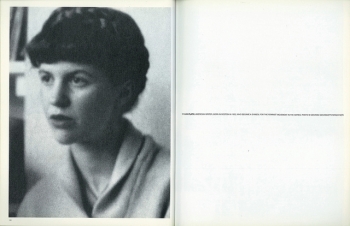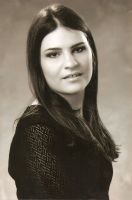Mushrooms by Sylvia Plath

Sylvia Plath (1932-1963) Born to middle class parents in Jamaica Plain, Massachusetts, Sylvia Plath published her first poem when she was eight. Sensitive, intelligent, compelled toward perfection in everything she attempted, she was, on the surface, a model daughter, popular in school, earning straight A`s, winning the best prizes. By the time she entered Smith College on a scholarship in 1950 she already had an impressive list of publications, and while at Smith she wrote over four hundred poems. Sylvia`s surface perfection was however underlain by grave personal discontinuities, some of which doubtless had their origin in the death of her father (he was a college professor and an expert on bees) when she was eight.
During the summer following her junior year at Smith, having returned from a stay in New York City where she had been a student “guest editor” at Mademoiselle Magazine, Sylvia nearly succeeded in killing herself by swallowing sleeping pills. She later described this experience in an autobiographical novel, The Bell Jar, published in 1963. After a period of recovery involving electroshock and psychotherapy Sylvia resumed her pursuit of academic and literary success, graduating from Smith summa cum laude in 1955 and winning at Fullbright scholarship to study at Cambridge, England. In 1956 she married the English poet Ted Hughes, and in 1960, when was 28, her first book, The Colossus, was published in England.
The poems in this book – formally precise, well wrought – show clearly the dedication with which Sylvia had served her apprenticeship; yet they give only glimpses of what was to come in the poems she would begin writing early in 1961. She and Ted Hughes settled for a while in an English country village in Devon, but less than two years after the birth of their first child the marriage broke apart. The winter of 1962-63, one of the coldest in centuries, found Sylvia living in a small London flat, now with two children, ill with flu and low on money.
The hardness of her life seemed to increase her need to write, and she often worked between four and eight in the morning, before the children woke, sometimes finishing a poem a day. In these last poems it is as if some deeper, powerful self has grabbed control; death is given a cruel physical allure and psychic pain becomes almost tactile. In this article I am going to analyze her poem “Mushrooms”.
Mushrooms Overnight, very Whitely, discreetly, Very quietly Our toes, our noses Take hold on the loam, Acquire the air. Nobody sees us, Stops us, betrays us; Тhe small grains make room. Soft fists insist on Heaving the needles, The leafy bedding, Even the paving. Our hammers, our rams, Earless and eyeless, Perfectly voiceless Widen the crannies, Shoulder through holes. We Diet on water, On crumbs of shadow, Bland-mannered, asking Little or nothing. So many of us! So many of us! We are shelves, we are Tables, we are meek, We are edible, Nudgers and shovers In spite of ourselves. Our kind multiplies: We shall by morning Inherit the earth. Our foot`s in the door.
“Mushrooms” by Sylvia Plath The speaker of the poem could be a woman who wants to have equal rights as men. “Whitely, discreetly, very quietly – Our toes, our noses”, these lines describe quiet, discreet women. “So many of us! We are shelves, we are Tables, we are meek” could mean that women helps everyone but they do not get any gratitude back. Mushrooms could symbolize unstoppable growth, revolution or liberation. The adverbs “whitely”, “discreetly” and “quietly’ describe to us that mushrooms are not as innocent as they look. They are on the move and women are as well. There is some confidence in the poem that women will be liberated. The mushrooms always find another way to grow. They grow all the time. “So many of us”. Women also survive despite everything. Plath uses mushrooms as a metaphor for a group of people who have had to assert themselves “discreetly”, “overnight”, and “very quietly”. Quiet discreet nature of mushrooms allows them to look perfectly harmless and innocent. “Earless and eyeless”, “perfectly voiceless”. But they are starting slowly to take control “over night”.
